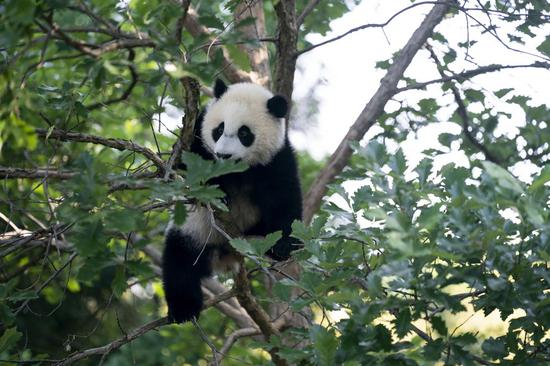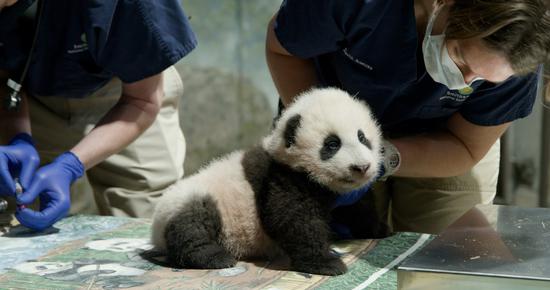Healthy and happy, panda cub Xiao Qi Ji ready to welcome visitors from across U.S.

Photo taken on May 20, 2021 shows the giant panda cub "Xiao Qi Ji" (little miracle, L) during a media preview at Smithsonian's National Zoo in Washington, D.C., the United States. (Xinhua/Liu Jie)
Born in the U.S. national zoo in Washington at the height of the pandemic, panda cub Xiao Qi Ji, now 9 months old and in good shape, made his first public appearance on Thursday and will soon welcome in-person visits by his avid fans across the country as the zoo is set for a phased reopening.
The cub, whose name translates into English as "little miracle," stepped out of his room around 7:30 a.m. ET for a one-hour media preview, together with his mom Mei Xiang and dad Tian Tian.
While the parents walked slowly with poise and grace and quickly found their spots to sit and enjoy the early morning bamboo treats, Xiao Qi Ji ran toward a tree with his head and butt shaking adorably and stayed atop the branches until ultimately falling asleep there.
The pandemic has forced the Smithsonian's National Zoo and Conservation Biology Institute to shut down for most of the months starting last March, but panda lovers have already familiarized themselves with Xiao Qi Ji since the cutie's formal webcam live debut back in January.
"Yesterday they weighed him and he was 45 pounds," Bryan Amaral, senior curator of mammals at the zoo, said of Xiao Qi Ji in an interview with Xinhua. "So clearly much bigger than when he was born. And I think people will be surprised when they get to come and see him in person ... And also a little bit unfortunate that people weren't here to be able to see some of that development happen in person, but he's doing great."
Amaral was not at all worried about any potential psychological impact on the famed panda household caused by the absence of visitors during the pandemic.
For one thing, he said, it's been a normal phenomenon for captive animals that the number of zoo visitors reduces in winter times. On the other hand, since the zoo has adopted a staged, slow reopening, "I don't suspect there's going to be any negative effect on the animals whatsoever," Amaral said.
Steve Monfort, the zoo's director, said judging from all the parameters that have been closely monitored by the care staff, Xiao Qi Ji "is growing up as a normal, healthy, and happy cub."
Speaking to Xinhua while Xiao Qi Ji was adjusting to a comfortable position on the tree, Monfort said pandas clearly like to see visitors and presumably "know that people love them," but the fact that they have been very well taken care of during the pandemic has contributed to them remaining unaffected by what could otherwise be a potentially harsh environment.
"When the visitors are not here, our animal care staff is very attentive to their needs, providing them with a lot of stimulation in their environment, special food treats, and lots of enrichment activities," he said, adding that as a result, the pandas are doing "extremely well" psychologically and physiologically, and that they "will be happy to see people back."
On Friday, the zoo will reopen at 20 percent of its full capacity, admitting 5,000 to 6,000 visitors on a daily basis. That means Xiao Qi Ji, for whom the world is still full of wonders, no longer has to wait too long before getting his first peek at the visitors.
"Today is probably the most people that he's seen in his life really," Amaral said of Xiao Qi Ji, adding there probably will be a day in the near future when the little bear comes to realize that the world is a different place. Yet, "animals in general are really resilient, and I think they'll do great," he said.
On the visitors' part, those who wish to see the giant pandas must obtain a separate free timed pass, the Asia Trail/Panda Pass, for each person in their party.
"You will need to wear a mask for giant Panda viewing," Monfort said. "We have to have a limited number of people come each day because the pandas spend a significant amount of time indoors in air conditioning and in a space that requires us to have restrictions on the numbers of visitors."

For the Chinese visitors who are planning a trip to the zoo especially for seeing the pandas, Monfort has some special words.
"We love the giant Panda. That is something that we share with every Chinese citizen, I'm sure," he said. "So we welcome you come and see our pandas. I've seen your pandas and your breeding facilities in China. So we're welcoming you. And really, we share something in common, which is that we love pandas and we want to save them."
The national zoo received its first pair of giant pandas, dubbed China's "national treasure," in 1972 as a gift from Beijing after the ice-breaking China trip by then President Richard Nixon. The zoo has since collaborated with Chinese professionals in studying and preserving the species, while the two sides have built excellent partnership and friendship.
"We are extremely proud of our long history of nearly 50 years of collaborating with our Chinese colleagues," Monfort said. He said no matter how the political relationship between Washington and Beijing may evolve, as a conservationist, he has and will always focus on saving the pandas, which he stressed are a "great species," from distinction and "making sure that they thrive in nature."
Speaking of the partnership between the two countries dedicated to panda caring and research, Monfort said the U.S. side is committed to making the relationship, already stronger than ever before, yield greater success in the decades to come.
"I think it's one of the most special and productive partnerships that we've ever been involved in. And I count, many of my colleagues in China as not just colleagues, but as friends," he said.
Once classified as an endangered species, giant pandas are now listed as vulnerable thanks to efforts by China and its international partners to restore and preserve their habitats.
To Monfort, the cooperation between the United States and China in panda preservation is "a great symbol of how partnership can work effectively and how we can get together on something that's really bigger than ourselves and make a difference."
